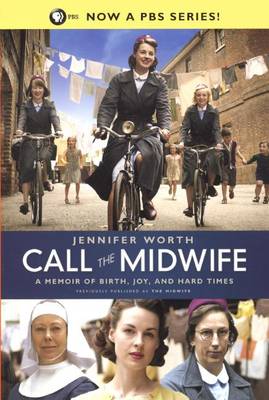Reviewed by readingwithwrin on
If you've watched the much loved pbs series than you will be pleasantly surprised on how true to this memoir they have stuck for the characters themselves and for some of the stories of Jenny's patients.
The people themselves seem fairly true to the ones on the show including the hijinks of some of the nuns and how they interact with one another. Jenny was still just as love-able and made me genuinely miss her when I remembered that she had not been apart of the series and for a few seasons.
1950's London East End seems like a different world, compared to today. Medicine and Medical technology was starting to change, people were still afraid of medical intervention, but were starting to see its usefulness. Midwives were the choice for giving birth, men weren't wanted in the room while giving birth, mothers and aunts thought they new best for how to give birth, and midwives were mostly left alone with no help from doctors unless absolutely needed. Besides that the most common method of transportation was bicycle or walking with very few cars around. Which allowed the children to play in the streets. Pram's were even able to be left outside with no fear of baby being stolen.
At times it seems like the 50's were simpler, but as Jenny learns more about the east end and her patients it is anything but simple. We get to join her in her first year as a midwife and learn things as she did about how to care for such patients and how to treat them, outside of the hospital environment. We also see a side of nuns that we never expect to have happened or been allowed. They joke and talk crudely when necessary all without anyone batting an eye (besides Jenny), and are treated with even more respect than police. Being a midwife or a nun in the east end gave you privileges it seemed that no one else had. It also showed you multiple sides of the city, both good and bad, evil and innocent all within the same chapter.
The narrator Nicola Barber reminded me of the narrator for the show and made this such an easy listen. Not only did I constantly feel like I was actually watching the show, but I couldn't wait to hear about the next patient and kept myself wanting to hear more about certain ones.
Overall I really loved this book, and can't wait to listen to the next one in the trilogy. At times it does go a bit more into detail about the procedures done, but that's to be expected in a nursing non-fiction book I believe. Mostly though this is about Jenny's experiences and those of her patients as she can best recall them.
“Now and then in life, love catches you unawares, illuminating the dark corners of your mind, and filling them with radiance. Once in awhile you are faced with a beauty and a joy that takes your soul, all unprepared, by assault.”
Blog Twitter Instagram
Reading updates
- Started reading
- 28 March, 2017: Finished reading
- 28 March, 2017: Reviewed
